Contents
- 0.1 What is kidney failure?
- 0.2 What do your kidneys do?
- 0.3 Are there stages of chronic kidney disease?
- 0.4 Stages of chronic renal failure / Kidney failure/ High creatinine
- 0.5 Who is at risk for chronic renal failure / Kidney failure/ High creatinine?
- 0.6 What causes chronic renal failure / Kidney failure/ High creatinine?
- 0.7 What are the symptoms of chronic renal failure / Kidney failure/ High creatinine?
- 0.8 What are the complications of chronic kidney disease?
- 0.9 How is chronic renal failure / Kidney failure/ High creatinine diagnosed?
- 0.10 What medications are prescribed for people with chronic kidney disease?
- 1 BOOK CONSULTATION WITH THE BEST NEPHROLOGIST IN RAIPUR NOW
- 2 OR
- 3 EMERGENCY- CALL- 9111181250 24 hour Emergency and Ambulance services available.
- 4 BOOK CONSULTATION WITH THE BEST NEPHROLOGIST IN RAIPUR NOW
- 5 Vidya hospital and kidney centre
What is kidney failure?
Having chronic renal failure / Kidney failure/ High creatinine means that there is damage to your kidneys and they aren’t working as well as they should. Chronic renal failure / Kidney failure/ High creatinine is called “chronic” because kidney function slowly gets worse over time. Chronic renal failure / Kidney failure/ High creatinine leads to kidney failure, which is also called end-stage kidney disease. At this point, you’ll need dialysis (artificial filtering) or a kidney transplant.
What do your kidneys do?
You have two kidneys. They are bean-shaped organs that are located toward your back, on either side of your spine, just underneath the rib cage. Each kidney is about the size of your fist. Your kidneys have many jobs, but their main job is to filter (clean) your blood, getting rid of toxins (wastes) and excess salt and water as urine. If your kidneys are damaged and don’t work as they should, wastes can build up in your blood and can make you sick. Your kidneys also balance the amount of salts and minerals in your body, make hormones that control blood pressure, make red blood cells and keep your bones strong.
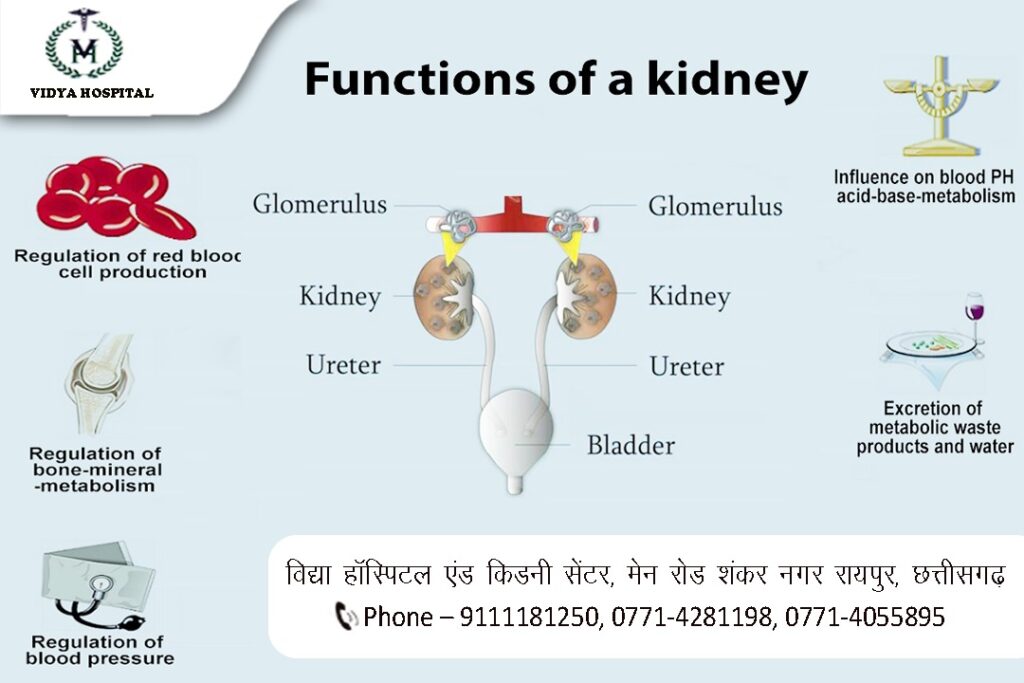
Are there stages of chronic kidney disease?
Yes, there are five stages of kidney disease. The stages are based on how well your kidneys are able to do their job – to filter out waste and extra fluid from your blood. The stages range from very mild (stage 1) to kidney failure (stage 5). Healthcare providers determine the stage of your kidney function according to the glomerular filtration rate (GFR). Your GFR is a number based on the amount of creatinine, a waste product, found in your blood, along with other factors including your age, race and gender.
Stages of chronic renal failure / Kidney failure/ High creatinine
Stage | GFR* (ml/min) | What it Means |
Stage 1 | 90 and higher | Your kidneys are working well but you have signs of mild kidney damage. |
Stage 2 | 60 to 89 | Your kidneys are working well but you have more signs of mild kidney damage |
Stage 3 | 30 to 59 | Your kidneys aren’t working as well as they should and you have moderately decreased kidney function. This is the most common stage. You may notice symptoms at this stage. |
Stage 4 | 15 to 29 | You have poor kidney function; your kidneys are moderately to severely damaged. |
Stage 5 | Less than 15 | Your kidneys are very close to failing or have failed. You need kidney dialysis or a kidney transplant. |
*GFR = glomerular filtration rate |
Who is at risk for chronic renal failure / Kidney failure/ High creatinine?
- Have diabetes.
- Have high blood pressure.
- Have heart disease.
- Have a family history of kidney disease.
- Are over 60 years of age.
Have a long history of taking pain killers such as aspirin and ibuprofen
What causes chronic renal failure / Kidney failure/ High creatinine?
Kidney diseases happen when your kidneys are damaged and can’t filter your blood. The damage can happen quickly – when it’s caused by injury or toxins – or, more commonly, over months or years. High blood pressure (hypertension) and diabetes are the two most common causes of chronic kidney disease.
What are the symptoms of chronic renal failure / Kidney failure/ High creatinine?
- A need to pee (urinate) more often.
- Tiredness, weakness, low energy level.
- Loss of appetite.
- Swelling of your hands, feet and ankles.
- Shortness of breath.
- Blood in your urine; foamy urine.
- Puffy eyes.
- Dry and itchy skin.
- Trouble concentrating.
- Trouble sleeping
- Nausea or vomiting.
- Muscle cramps.
- High blood pressure.
- Darkening of your skin.
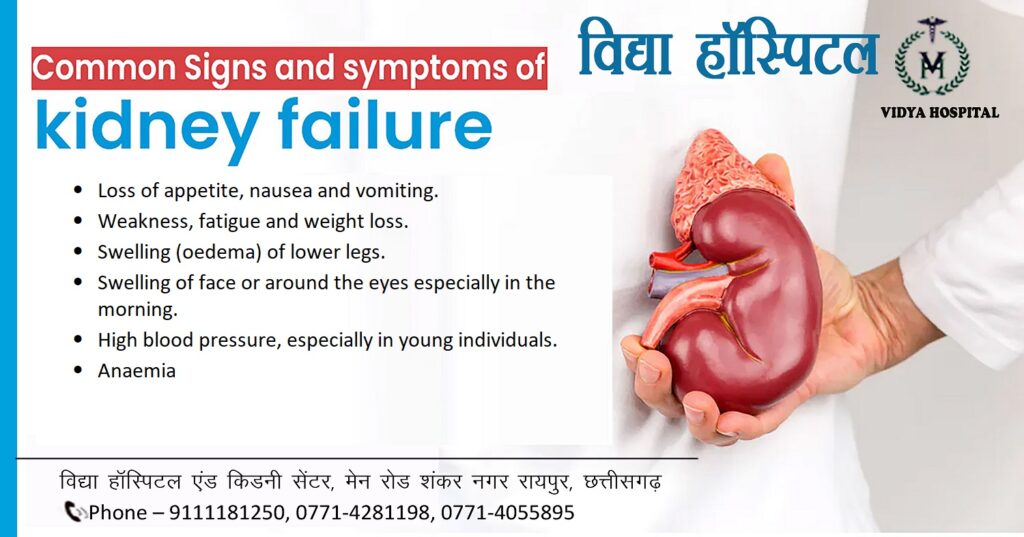
What are the complications of chronic kidney disease?
- Low red blood cell count (anemia).
- Weak and brittle bones.
- Metabolic acidosis. This is a chemical imbalance (acid-base) in your blood caused by decrease in kidney function.
- High blood pressure.
- Heart disease, including increased risk of stroke and heart attack.
- High potassium (hyperkalemia), which affects your heart’s ability to function correctly.
- High phosphorus (hyperphosphatemia).
- Fluid build-up, leading to swelling in feet, ankles and hands; fluid in your lungs.
- Erectile dysfunction, fertility problems.
- Decreased immune response, increasing your risk of infection.
How is chronic renal failure / Kidney failure/ High creatinine diagnosed?
- Glomerular filtration rate (GFR)- This describes how efficiently your kidneys are filtering blood – how many milliliters per minute your kidneys are filtering. Your GFR is used to determine the stage of your kidney disease.
- Serum creatinine level which tells how well your kidneys are removing this waste product.. A high creatinine level in your blood means that your kidneys are not functioning well enough to get rid it in your urine.
- Urine protein test will look for the presence of protein (albumin) and blood in your urine. Well-functioning kidneys should not have blood or proteins in your urine.
- Ultrasound, magnetic resonance imaging (MRI) and/or computerized tomography (CT) scans
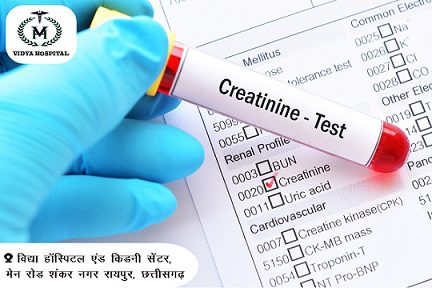
What medications are prescribed for people with chronic kidney disease?
- An angiotensin-converting enzyme (ACE) inhibitor or an angiotensin receptor blocker (ARB) to lower your blood pressure.
- A diuretic to help your body eliminate extra fluid.
- Medications to lower cholesterol levels.
- Erythropoetin, to build red blood cells if you are anemic.
- Vitamin D and calcitrol to prevent bone loss.
- Phosphate binder if your kidneys can’t eliminate phosphate
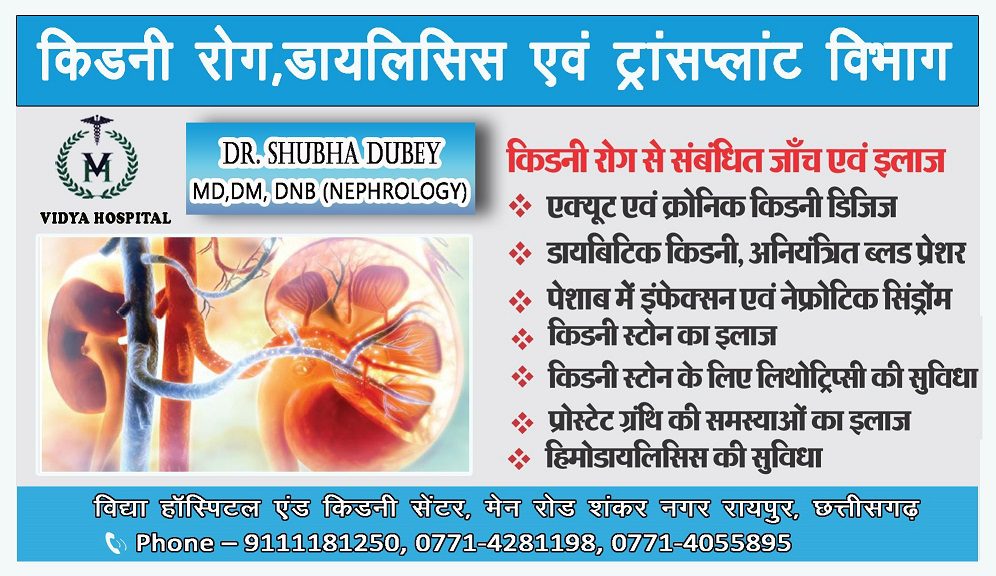
What is kidney dialysis?
Because there is no cure for CKD, if you are in late-stage disease, you and your healthcare team must consider additional options. Complete kidney failure, left untreated, will result in death. Options for end stages of CKD include dialysis and kidney transplantation. Dialysis is a procedure that uses machines to remove waste products from your body when your kidneys are no longer able to perform this function. With hemodialysis, your blood is circulated through a machine that removes waste products, excess water and excess salt. The blood is then returned to your body. Hemodialysis requires three to four hours, three times a week and is performed at a clinic, hospital or dialysis center.
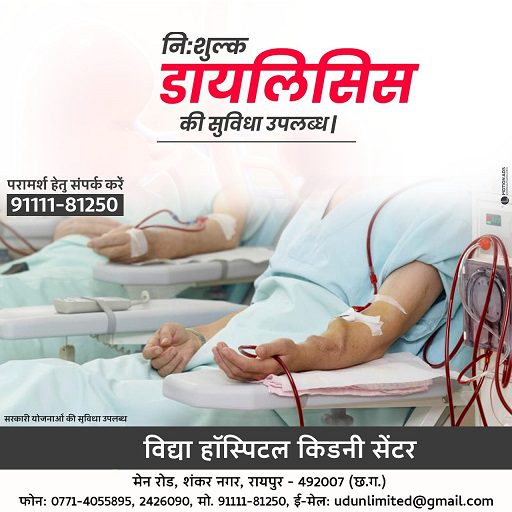
What is kidney transplantation?
Kidney transplantation involves placing a healthy kidney into your body where it can perform all of the functions that a failing kidney can’t. Kidneys for transplantation come from two sources: living donors and deceased donors. Living donors are usually immediate family members or sometimes spouses. This is possible because a person can live well with one healthy kidney.
BOOK CONSULTATION WITH THE BEST NEPHROLOGIST IN RAIPUR NOW

OR
EMERGENCY- CALL- 9111181250
24 hour Emergency and Ambulance services available.
Can chronic renal failure / Kidney failure/ High creatinine be prevented?
- Control your high blood pressure. Normal blood pressure is 120/80.
- Control your blood sugar if you have diabetes.
- Eat a healthy diet. Follow a low-fat, low-salt diet.
- Don’t smoke.
- Be active for 30 minutes at least five days a week.
- Maintain a healthy weight.
- Take non-prescription pain relievers only as directed. Taking more than directed can damage your kidneys.
What can I expect if I have kidney disease?
Early detection and appropriate treatment are important in slowing the disease process, with the goal of preventing or delaying kidney failure. You will need to keep your medical appointments, take your medications as prescribed, stick to a healthy diet and monitor your blood pressure and blood sugar.
BOOK CONSULTATION WITH THE BEST NEPHROLOGIST IN RAIPUR NOW
To get more information about chronic renal failure / Kidney failure/ High creatinine use the links below
Vidya hospital and kidney centre
Address: Shankar nagar Main road, Raipur(CG)
Email: [email protected]
Phone: 9111181250, 07714281198,9827197924